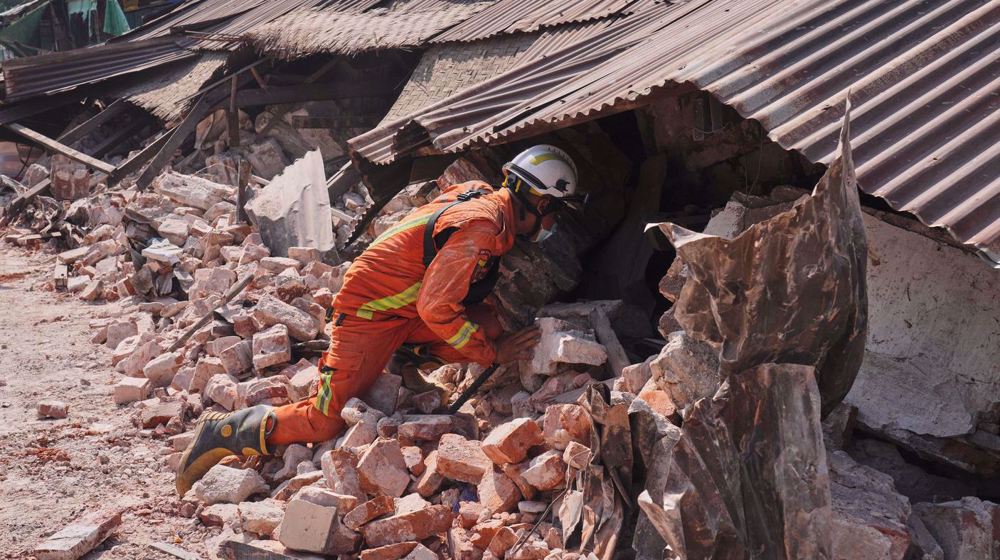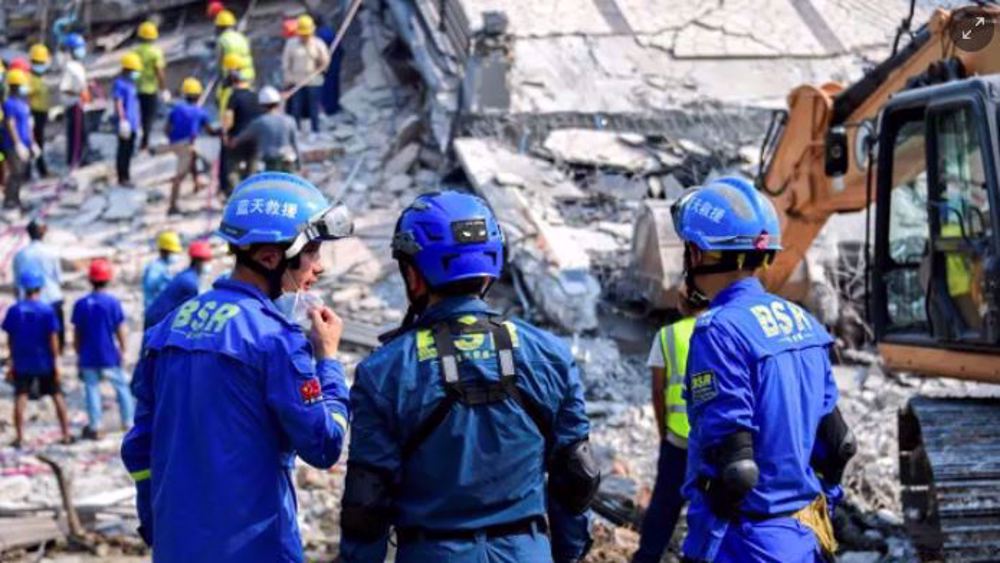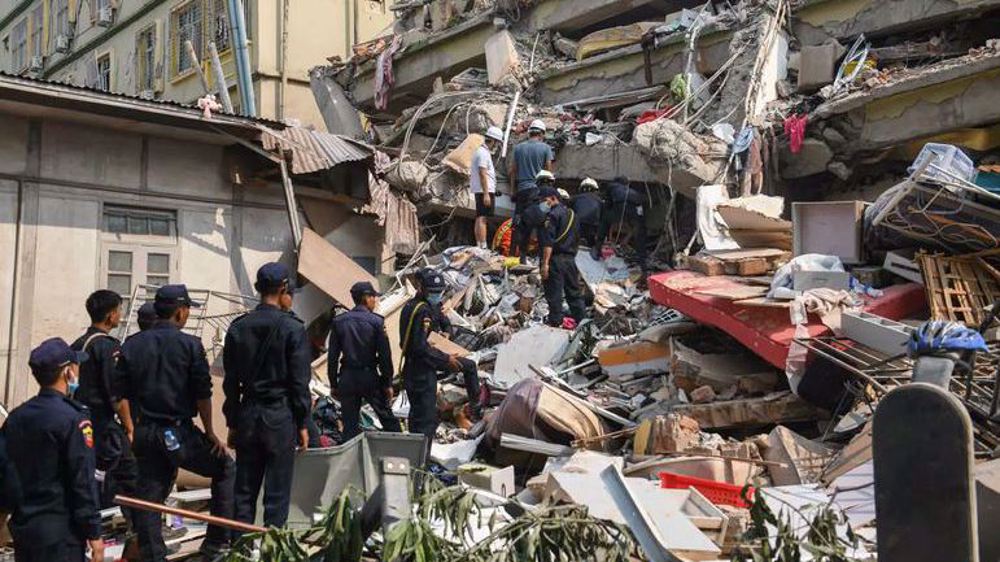G7 ministers in Hiroshima call for world without nuclear weapons
Foreign ministers from the Group of Seven (G7) industrialized countries at a meeting in Japan have called for a world without nukes.
"We reaffirm our commitment to seeking a safer world for all and to creating the conditions for a world without nuclear weapons in a way that promotes international stability," the group said in their final declaration at a Hiroshima meeting in Japan on Monday
The top diplomats cited deteriorating security conditions in Syria, Ukraine and particularly the Korean Peninsula as key challenges to achieving the goal.
"This task is made more complex by the deteriorating security environment in a number of regions, such as Syria and Ukraine, and, in particular by North Korea's repeated provocations," it added.
Meanwhile, Japanese Foreign Minister Fumio Kishida expressed hope that the meeting in Hiroshima will revive the momentum for efforts towards nuclear disarmament.
Yasuhisa Kawamura, the Japanese Foreign Ministry press secretary, said the Hiroshima declaration aims to revitalize the effort to eliminate nuclear weapons.
The declaration comes as some of the G7 member states including the US and Britain possess huge nuclear stockpiles. Nuclear weapons states have refused to destroy or reduce their stocks of nuclear weapons despite repeated promises to do so.
Some of the advanced economies are spending billions of dollars to upgrade their deadly weapons.
On Sunday, a US official said there will be no formal apology from US Secretary of State John Kerry, when he travels to the Japanese city of Hiroshima.
“If you are asking whether the secretary of state came to Hiroshima to apologize, the answer is no,” a senior US official told reporters late on Sunday, adding, “If you are asking whether the secretary and I think all Americans and all Japanese are filled with sorrow at the tragedies that befell so many of our countrymen, the answer is yes.”
Kerry also visited the site of an American nuclear bomb attack in the Japanese city of Hiroshima. The trip marks the first-ever visit to the city by a senior US official.

Kerry is the first secretary of state to visit Hiroshima, which was obliterated by an American nuclear bomb on August 6, 1945 that killed 140,000 people. Three days later, another blast killed some 74,000 people in Nagasaki, on the last days of World War two.
There has never been an official apology from Washington for its nuclear bombing of the two Japanese cities.
The G7 group consists of the seven wealthiest countries in the world as reported by the International Monetary Fund (IMF), namely Canada, France, Germany, Italy, Japan, the United Kingdom and the United States.
The group has its origins in the Group of Six or G6 formed in 1975. It then changed to the G7 in 1976 with the addition of Canada, and to the G8 with Russia joining in 1998.
In 2014, Russia was excluded from the group over the Ukrainian crisis. The European Union has participated in the summit since the 1980s.
The G7 is now criticized for its representational deficit, not including the world’s largest emerging economies such as Brazil, India, China and South Africa, as well as Russia itself.
G7 taken hostage by the selfish interests
Chinese Foreign Ministry spokesman Lu Kang during a news briefing on Monday urged the G7 economies to take an attitude of seeking truth in handling issues relevant to East and South China Seas.
"I also want to say, if the G7 wants to continue playing a major role in the world, it should take an attitude of seeking truth from the facts to handle the issues the international community is most concerned with at the moment. If the G7 is taken hostage by the selfish interests of certain countries, then this probably won't be beneficial to the G7's influence, role and future development," the spokesman said.

This came after foreign ministers from the G7 said in a statement that they strongly oppose provocation in the East and South China Seas, where China is locked in territorial disputes with nations including the Philippines, Vietnam and Japan. “We express our strong opposition to any intimidating coercive or provocative unilateral actions that could alter the status quo and increase tensions.”
Washington and China’s rivals have been accusing Beijing of attempting to take advantage of the situation and gradually assert control on the South and East China Sea.
Beijing, however, rejects the allegations and accuses Washington of meddling in the regional issues and deliberately stirring up tensions in the region.
Beijing says it is determined to safeguard its sovereignty and territorial integrity in the China Sea. Beijing insists Washington must stay out of the row.

Death toll from Myanmar quake rises to over 3,085

WHO warns Myanmar quake ‘top-level emergency’, seeks urgent funding

Iran voices readiness to help quake-stricken Myanmar, Thailand
VIDEO | Indian parliament approves controversial Muslim Waqf law
Yemen's army targets Tel Aviv, downs Giant Shark F360 drone in Sa’daa amid Israel’s genocide in Gaza
Islamic scholars issue fatwa urging Muslim nations to support Palestinian resistance
VIDEO | Trump trade war
Houthi: Intensified US aggression against Yemen failed
Israeli captives held in areas targeted for evacuation by the regime: Al-Qassam Brigades
VIDEO | President Yoon of South Korea impeached, dismissed
Trump tariffs led to a $2.5 trillion wipeout for the US stock markets













 This makes it easy to access the Press TV website
This makes it easy to access the Press TV website